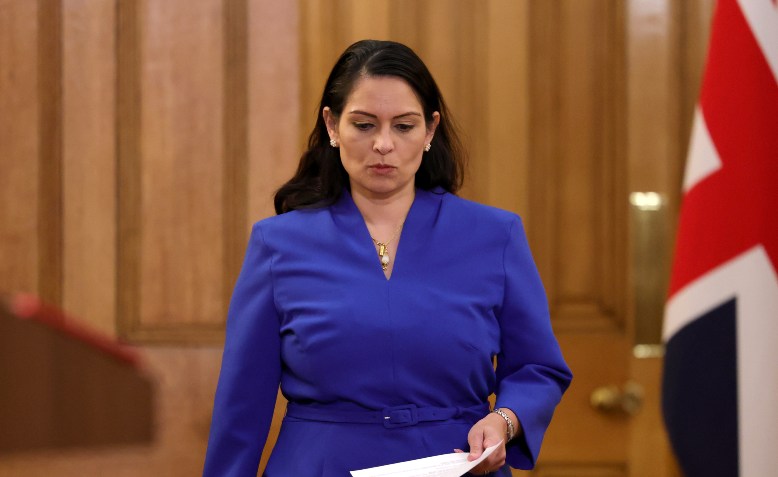 Priti Patel. Photo: Pippa Fowles / No 10 Downing Street / Flickr / CC BY-NC-ND 2.0, license linked below article
Priti Patel. Photo: Pippa Fowles / No 10 Downing Street / Flickr / CC BY-NC-ND 2.0, license linked below article
There is still an opportunity to overturn Priti ‘authoritarian’ Patel’s decision to extradite Julian Assange, but it will take mass resistance, argues John Rees
If you have been living on one of the remoter planets of the known universe it will have come as a shock that the Home Secretary Priti Patel agreed last Friday to the US government’s demand that Julian Assange be extradited to face a trial which could land him with a 175-year prison sentence.
But for earth-dwellers, particularly those that have been following the Home Secretary’s wholesale attack on civil liberties, it will have been less of a surprise.
Patel and the Johnson government have plenty of reasons for disliking those who expose war-mongering and corporate greed, as WikiLeaks did in successive releases for which the US now wish to charge Assange under its 1917 Espionage Act.
But the persecution of Julian Assange by the Tory government is part of a much wider attack on our freedoms. The Tory attempt to silence critical journalistic voices, which is what the assault on Julian Assange is intended to do, goes hand in hand with the attempts to stifle effective political protests, to further tighten what are already the most restrictive anti-trade union laws in Europe, to alter the voter registration process to effectively exclude poor and marginalised voters, and to beef-up and already draconian Official Secrets Act.
Moreover, as the fragile Johnson premiership depends ever more completely on his posturing as a ‘war time’ leader over Ukraine there was never going to be an unforced move made by a Johnson loyalist like the Home Secretary that would cause any ripple, never mind a wholesale breach, in the special relationship with the US government.
But even a hardline anti-civil liberties Tory government can be forced to abandon policies if they are shown to be unpopular enough. Indeed, Johnson has a number of spectacular policy reverses strewn in his wake: the windfall tax on energy corporations, mandatory Covid jabs for NHS staff, action over water companies dumping raw sewage, emergency visas for truck drivers, free school meals concessions, the second Covid lockdown, prosecuting troops for genocide, mandatory face masks on public transport…all these have seen screeching u-turns by the government.
With talk of an autumn general election and a prime minster who barely survived a vote of confidence by his own MPs the Tory party is particularly vulnerable to effective political protest.
There is already a mounting wave of opposition to the extradition of Assange. From Amnesty International to the Council of Europe practically every international body concerned with journalistic freedom has supported Assange. So have journalists’ unions, including the NUJ and its Australian sister union, and the International Federation of Journalists.
Even the mainstream press has at last realised that there is a fundamental threat to freedom of expression at stake in the Assange case. Most of the print press is now sympathetic, including the Mail and the Telegraph, although not the Sun. The broadcast media, including the BBC, is at least providing more coverage, and more balanced coverage, than it has in the past.
Some of this will have an effect on the government, although some of it, like criticism from NGOs, will be readily dismissed by the Tory hierarchy.
The real virtue of such publicity is that it gives ordinary citizens the feeling that they will not be alone if they support Assange, that it is the right and necessary thing to do. This in turn can spark mass campaigning.
Every MP will tell you that the thing which most grabs their attention is when they get more than 100 emails in their inbox on a single issue. Then they know that beyond that there are thousands, perhaps tens of thousands, of constituents that feel strongly on that issue. And those are the kind of numbers that can decide an election.
But that kind of active response cannot be generated by publicity alone. What is also needed is an active campaigning base. Rallies and meetings, marches and protests, create an activist core that can drive a wider periphery of participation.
The labour movement, the social movements, and the left already possess such networks of course, as last Saturday’s huge TUC demonstration showed. These too need to be won to a more active and committed stance on the Assange issue.
These are pressing tasks. There still exists the chance to appeal against Priti Patel’s decision and the earlier Magistrates Court ruling against Assange in the English courts. But that process will probably take months, not years. The window of opportunity is closing. Urgency is necessary.
Before you go
If you liked this article, please consider getting involved. Counterfire is a revolutionary socialist organisation working to build the movements of resistance and socialist ideas. Please join us and help make change happen.

